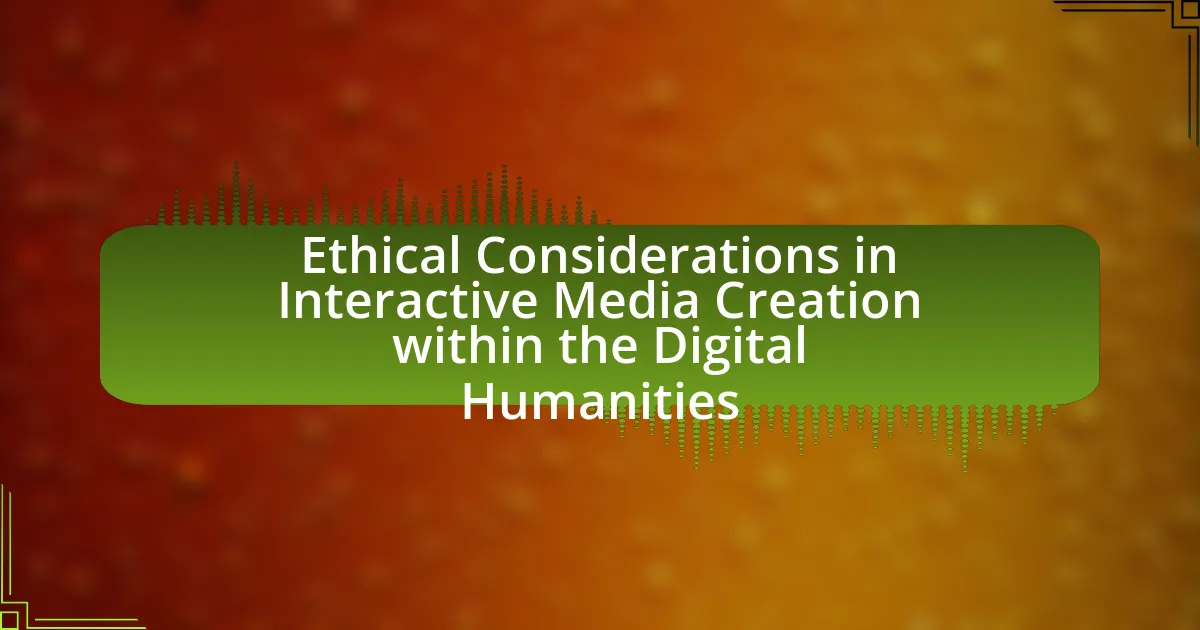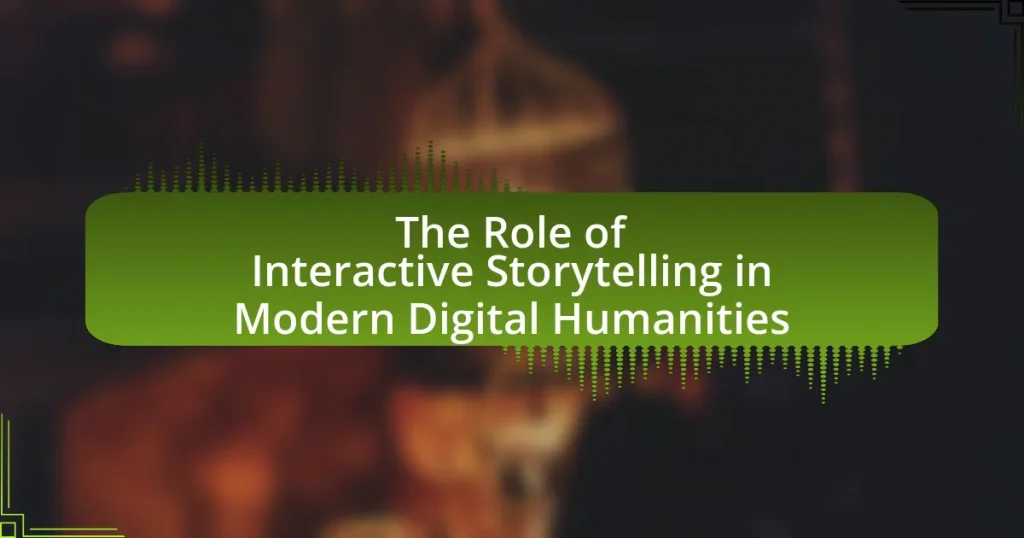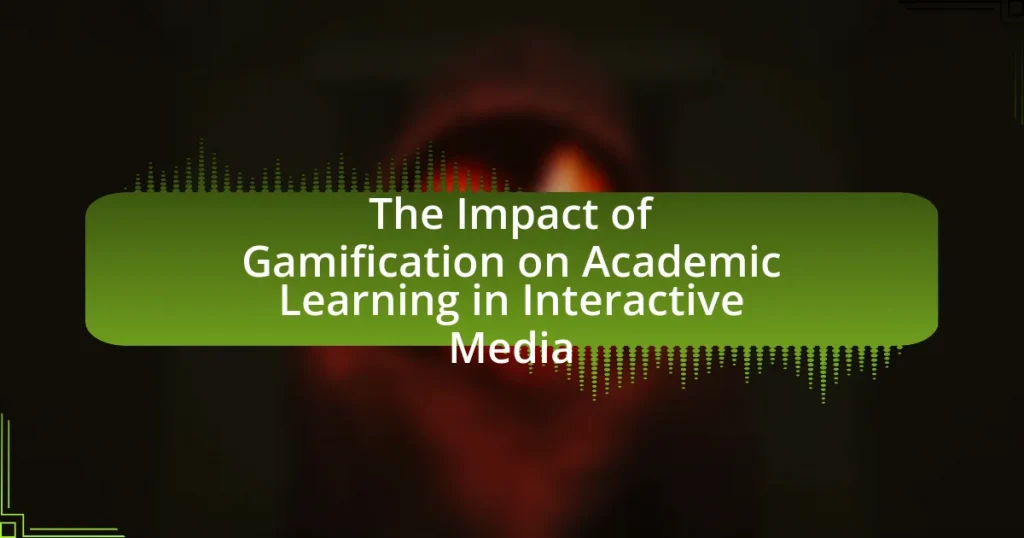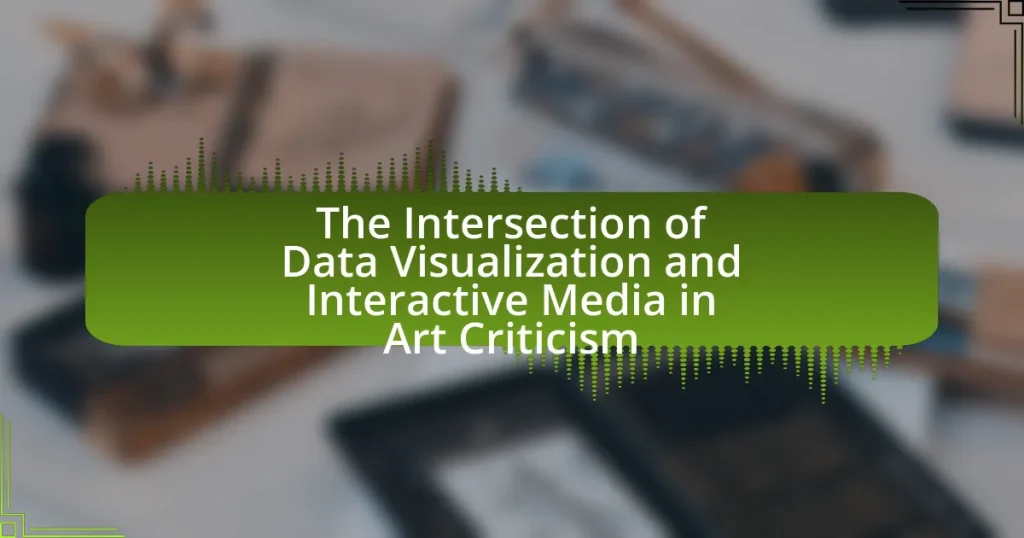The article focuses on ethical considerations in interactive media creation within the Digital Humanities, addressing critical issues such as representation, consent, accessibility, and bias. It emphasizes the importance of ethical frameworks and stakeholder involvement in ensuring responsible content creation and user engagement. Key topics include the impact of ethical practices on design processes, the role of community feedback, and the implications of data privacy. Additionally, the article explores future trends and challenges in the field, highlighting the need for ongoing education and resources to support ethical integrity in digital projects.
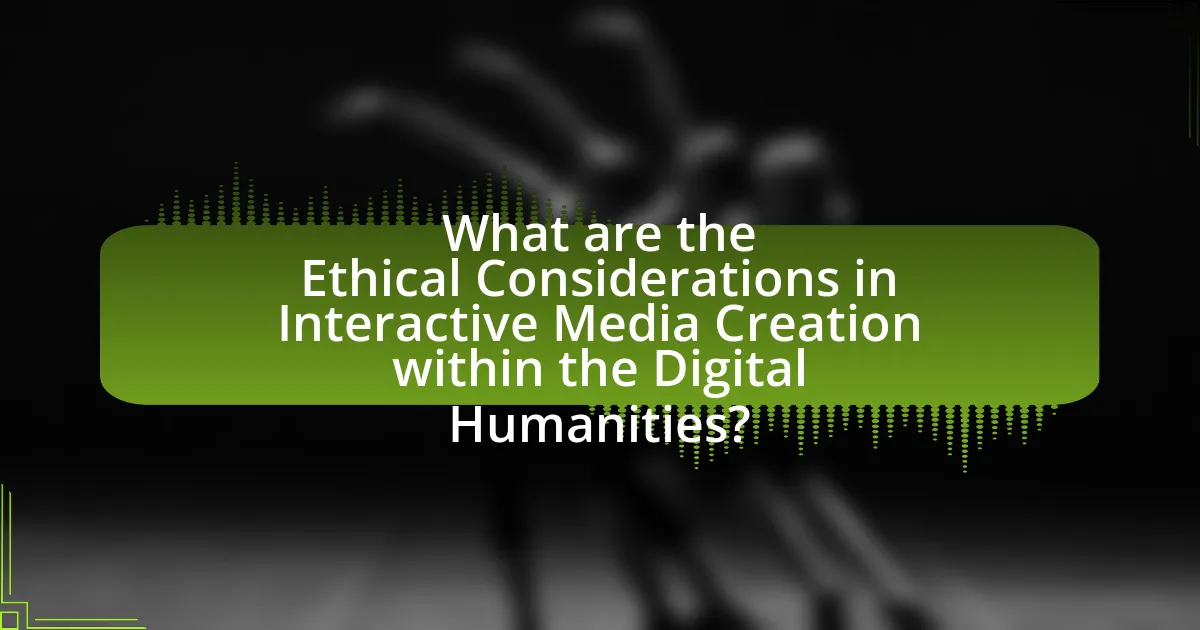
What are the Ethical Considerations in Interactive Media Creation within the Digital Humanities?
Ethical considerations in interactive media creation within the Digital Humanities include issues of representation, consent, accessibility, and the potential for bias. These factors are crucial as they influence how diverse communities are portrayed and engaged within digital projects. For instance, ensuring that marginalized voices are accurately represented requires careful curation and collaboration with those communities, which is supported by the principle of informed consent. Additionally, accessibility must be prioritized to ensure that all users, regardless of ability, can engage with the media, aligning with the Web Content Accessibility Guidelines (WCAG). Furthermore, the risk of bias in algorithms and content creation necessitates ongoing scrutiny to promote fairness and inclusivity in digital narratives.
Why is ethics important in the context of interactive media?
Ethics is crucial in the context of interactive media because it governs the responsible creation and consumption of content, ensuring that user rights, privacy, and well-being are prioritized. Ethical considerations help prevent harm, misinformation, and exploitation, fostering trust between creators and users. For instance, the Pew Research Center highlights that 64% of Americans believe that social media platforms should be held accountable for the content shared on their sites, indicating a societal demand for ethical standards in digital interactions. By adhering to ethical guidelines, interactive media can promote inclusivity, respect, and transparency, ultimately enhancing user experience and societal impact.
What ethical dilemmas commonly arise in interactive media projects?
Ethical dilemmas in interactive media projects often include issues of user privacy, data security, and representation. User privacy concerns arise when projects collect personal data without informed consent, potentially violating ethical standards set by organizations like the American Psychological Association. Data security is critical, as breaches can expose sensitive information, leading to legal repercussions and loss of trust. Representation issues occur when media fails to accurately depict diverse groups, which can perpetuate stereotypes and marginalization, as highlighted in studies on media representation. These dilemmas necessitate careful consideration to ensure ethical integrity in the creation and implementation of interactive media.
How do ethical considerations impact the design process?
Ethical considerations significantly impact the design process by guiding decision-making to ensure respect for user rights, cultural sensitivity, and social responsibility. Designers must evaluate the implications of their work on diverse audiences, which can influence choices related to content, accessibility, and user engagement. For instance, the Association for Computing Machinery’s Code of Ethics emphasizes the importance of avoiding harm and promoting fairness, which directly shapes how interactive media is developed. This ethical framework encourages designers to prioritize user welfare and inclusivity, ultimately leading to more responsible and impactful digital humanities projects.
What role do stakeholders play in ethical decision-making?
Stakeholders play a crucial role in ethical decision-making by influencing the values, priorities, and outcomes of decisions within organizations. Their perspectives help identify ethical dilemmas and ensure that diverse viewpoints are considered, which is essential in the context of interactive media creation in the Digital Humanities. For instance, stakeholders such as creators, users, funders, and community members contribute to discussions about the ethical implications of content, representation, and accessibility. This collaborative approach fosters accountability and transparency, leading to more responsible and inclusive decision-making processes.
Who are the key stakeholders in interactive media creation?
The key stakeholders in interactive media creation include content creators, developers, users, funders, and regulatory bodies. Content creators, such as artists and writers, generate the narrative and visual elements, while developers are responsible for the technical implementation and functionality of the media. Users engage with the interactive media, providing feedback and influencing future iterations. Funders, including investors and institutions, provide the necessary financial support for projects, and regulatory bodies establish guidelines and standards to ensure ethical practices. Each stakeholder plays a crucial role in shaping the development and impact of interactive media within the digital humanities.
How can stakeholder perspectives influence ethical outcomes?
Stakeholder perspectives can significantly influence ethical outcomes by shaping the values and priorities that guide decision-making processes. When stakeholders, such as creators, users, and communities, express their views, these insights can lead to a more comprehensive understanding of ethical implications in interactive media. For instance, research by the Digital Humanities Initiative highlights that incorporating diverse stakeholder feedback can enhance the ethical considerations of projects, ensuring that they reflect a wider range of societal values and concerns. This alignment with stakeholder perspectives can mitigate potential ethical dilemmas and foster responsible practices in digital humanities projects.
What frameworks exist for addressing ethical issues in digital humanities?
Frameworks for addressing ethical issues in digital humanities include the Digital Humanities Manifesto, the Ethics of Digital Humanities framework, and the Fair Use Guidelines for Digital Humanities. The Digital Humanities Manifesto emphasizes collaborative practices and the importance of transparency in research processes. The Ethics of Digital Humanities framework provides guidelines for ethical data management, authorship, and the impact of digital projects on communities. Fair Use Guidelines offer a legal framework for the ethical use of copyrighted materials in digital projects, ensuring that creators respect intellectual property rights while promoting access to knowledge. These frameworks collectively guide practitioners in navigating ethical dilemmas in the field.
What are the most recognized ethical guidelines in the field?
The most recognized ethical guidelines in the field of Interactive Media Creation within the Digital Humanities include the principles of respect for persons, beneficence, and justice. These guidelines are derived from established ethical frameworks such as the Belmont Report, which emphasizes the importance of informed consent, minimizing harm, and ensuring equitable distribution of benefits and burdens in research. Additionally, the Association of Internet Researchers (AoIR) provides ethical guidelines that focus on transparency, accountability, and the protection of participants’ privacy in digital environments. These frameworks collectively ensure that ethical considerations are integrated into the creation and dissemination of interactive media in the Digital Humanities.
How can these frameworks be applied in practice?
These frameworks can be applied in practice by integrating ethical guidelines into the design and development processes of interactive media projects within the Digital Humanities. For instance, practitioners can utilize frameworks such as the “Ethics of Care” to ensure that the needs and perspectives of diverse user groups are prioritized, fostering inclusivity and respect for cultural sensitivities. Additionally, implementing participatory design methods allows stakeholders, including marginalized communities, to actively contribute to the creation process, thereby enhancing ethical accountability. Research by the Digital Humanities Initiative highlights that projects adhering to ethical frameworks not only improve user engagement but also promote responsible scholarship, as evidenced by case studies demonstrating increased community trust and collaboration.
How do ethical considerations affect user engagement and experience?
Ethical considerations significantly influence user engagement and experience by fostering trust and promoting responsible interactions. When creators prioritize ethical practices, such as transparency, user consent, and data privacy, users are more likely to engage positively with the content. For instance, a study published in the Journal of Business Ethics found that ethical marketing practices enhance consumer trust, leading to increased engagement and loyalty. This correlation underscores the importance of ethical frameworks in shaping user experiences, as users tend to favor platforms that respect their rights and values.
What are the implications of data privacy in interactive media?
Data privacy in interactive media has significant implications for user trust, regulatory compliance, and ethical content creation. The collection and use of personal data in interactive platforms can lead to breaches of privacy, resulting in users feeling vulnerable and potentially leading to a decline in engagement. For instance, the General Data Protection Regulation (GDPR) in Europe mandates strict guidelines on data handling, compelling companies to ensure transparency and user consent, which directly impacts how interactive media is developed and delivered. Furthermore, ethical considerations arise when creators must balance innovative user experiences with the responsibility of protecting sensitive information, as failure to do so can result in legal repercussions and damage to reputation.
How can creators ensure user data is handled ethically?
Creators can ensure user data is handled ethically by implementing transparent data collection practices and obtaining informed consent from users. Transparency involves clearly communicating what data is being collected, how it will be used, and who will have access to it. Informed consent requires that users understand their rights regarding their data and voluntarily agree to the terms before any data collection occurs. According to the General Data Protection Regulation (GDPR), organizations must provide users with clear information about data processing activities, reinforcing the importance of ethical data handling.
What are the consequences of failing to protect user privacy?
Failing to protect user privacy can lead to severe consequences, including identity theft, financial loss, and erosion of trust in digital platforms. Identity theft occurs when personal information is accessed and misused, resulting in significant financial repercussions for victims, with the Federal Trade Commission reporting that in 2020, consumers lost over $3.3 billion to fraud. Additionally, organizations that fail to safeguard user data may face legal penalties, as seen in the European Union’s General Data Protection Regulation, which imposes fines up to 4% of annual global revenue for non-compliance. The erosion of trust can lead to decreased user engagement and loyalty, ultimately harming the reputation and viability of digital platforms.

How can ethical considerations be integrated into the creative process?
Ethical considerations can be integrated into the creative process by establishing guidelines that prioritize respect for individuals, communities, and cultural contexts. This integration involves conducting thorough research to understand the implications of creative choices, ensuring that diverse perspectives are represented, and actively engaging stakeholders in the development process. For instance, the Association of Internet Researchers emphasizes the importance of ethical reflection in digital humanities projects, advocating for transparency and accountability in how data is collected and used. By adhering to these principles, creators can foster an environment that values ethical responsibility while enhancing the integrity of their work.
What best practices should creators follow to uphold ethical standards?
Creators should prioritize transparency, respect for intellectual property, and inclusivity to uphold ethical standards. Transparency involves clearly communicating the purpose, funding sources, and potential biases of their work, which fosters trust and accountability. Respect for intellectual property requires creators to properly attribute sources and obtain necessary permissions, thereby honoring the rights of original authors. Inclusivity ensures that diverse perspectives are represented and that content is accessible to all audiences, promoting equity in the digital humanities. These practices are supported by ethical guidelines from organizations such as the American Association of University Professors, which emphasizes the importance of integrity and respect in scholarly work.
How can transparency be maintained throughout the project lifecycle?
Transparency can be maintained throughout the project lifecycle by implementing regular communication, documentation, and stakeholder engagement. Regular communication ensures that all team members and stakeholders are informed about project progress, challenges, and changes, fostering an environment of trust. Documentation of decisions, processes, and outcomes provides a clear record that can be referenced, ensuring accountability and clarity. Engaging stakeholders through feedback sessions and updates allows for their input and concerns to be addressed, reinforcing a collaborative atmosphere. Research indicates that projects with high transparency levels are more likely to achieve their objectives and maintain stakeholder satisfaction, as evidenced by studies in project management literature.
What role does community feedback play in ethical media creation?
Community feedback is essential in ethical media creation as it ensures that diverse perspectives are considered, promoting inclusivity and accountability. Engaging with the community allows creators to identify potential biases, cultural sensitivities, and ethical dilemmas that may arise in their work. For instance, research by the Digital Media and Learning Research Hub highlights that projects incorporating community input are more likely to resonate with audiences and avoid misrepresentation. This collaborative approach not only enhances the quality of the media produced but also fosters trust between creators and their audience, ultimately leading to more responsible and ethical media practices.
What challenges do creators face when implementing ethical practices?
Creators face significant challenges when implementing ethical practices, primarily due to the complexity of balancing artistic freedom with social responsibility. This challenge is compounded by the diverse interpretations of ethics across cultures and communities, leading to potential conflicts in audience expectations. Additionally, creators often encounter difficulties in navigating copyright laws and intellectual property rights, which can hinder their ability to ethically source materials. A study by the Digital Humanities Quarterly highlights that creators frequently struggle with transparency in their processes, as audiences increasingly demand accountability regarding data usage and representation. These factors collectively complicate the ethical landscape for creators in the digital humanities.
How can resource constraints impact ethical decision-making?
Resource constraints can significantly impact ethical decision-making by limiting the options available to individuals and organizations, often leading to compromised ethical standards. When resources such as time, money, or personnel are scarce, decision-makers may prioritize efficiency or cost-effectiveness over ethical considerations, resulting in decisions that could harm stakeholders or violate ethical norms. For instance, a study by the American Psychological Association found that organizations facing budget cuts often experience increased pressure to cut corners, which can lead to unethical practices like data manipulation or neglecting user privacy. This illustrates how resource limitations can create an environment where ethical decision-making is undermined, ultimately affecting the integrity of outcomes in fields like digital humanities.
What strategies can be employed to overcome these challenges?
To overcome challenges in ethical considerations in interactive media creation within the digital humanities, developers can implement transparent practices, establish clear ethical guidelines, and engage in continuous stakeholder dialogue. Transparent practices ensure that creators disclose their methodologies and intentions, fostering trust among users. Establishing clear ethical guidelines, such as those proposed by the Association of Internet Researchers, provides a framework for responsible content creation. Continuous dialogue with stakeholders, including users and affected communities, allows for the identification of ethical concerns and the adaptation of practices to address them effectively. These strategies collectively enhance ethical standards and promote responsible engagement in digital humanities projects.

What future trends may influence ethical considerations in interactive media?
Future trends such as advancements in artificial intelligence, increased user data privacy regulations, and the rise of immersive technologies like virtual and augmented reality will significantly influence ethical considerations in interactive media. The integration of AI in content creation raises questions about authorship and bias, as algorithms can perpetuate existing societal biases if not carefully managed. Additionally, regulations like the General Data Protection Regulation (GDPR) emphasize the importance of user consent and data protection, compelling creators to prioritize ethical data usage. Furthermore, immersive technologies challenge traditional narratives and user interactions, necessitating ethical frameworks that address user experience and psychological impacts. These trends collectively shape the ethical landscape, requiring ongoing dialogue and adaptation within the field of interactive media.
How might emerging technologies reshape ethical frameworks?
Emerging technologies are likely to reshape ethical frameworks by introducing new challenges and considerations that require reevaluation of existing moral principles. For instance, advancements in artificial intelligence and machine learning can lead to biases in decision-making processes, necessitating the development of ethical guidelines that address fairness and accountability. A study by the AI Now Institute highlights that algorithmic bias can perpetuate discrimination, emphasizing the need for frameworks that ensure transparency and inclusivity in technology deployment. Additionally, the rise of virtual reality and augmented reality raises questions about user consent and the impact of immersive experiences on behavior, prompting a reassessment of ethical standards in interactive media. These examples illustrate how emerging technologies compel society to adapt ethical frameworks to address novel dilemmas and ensure responsible innovation.
What potential ethical issues could arise from advancements in AI and VR?
Advancements in AI and VR could lead to several potential ethical issues, including privacy violations, misinformation, and the potential for addiction. Privacy violations may occur as AI systems collect and analyze vast amounts of personal data, raising concerns about consent and data security. Misinformation can proliferate through realistic VR simulations that may manipulate perceptions of reality, leading to harmful consequences. Additionally, the immersive nature of VR can foster addictive behaviors, impacting mental health and social interactions. These ethical concerns highlight the need for robust guidelines and regulations to ensure responsible development and use of these technologies.
How can creators prepare for future ethical challenges?
Creators can prepare for future ethical challenges by proactively engaging in continuous education about ethical standards and emerging technologies. This involves staying informed on the latest developments in digital ethics, such as data privacy laws and the implications of artificial intelligence in media. For instance, the General Data Protection Regulation (GDPR) in Europe has set a precedent for data handling that creators must understand to avoid legal repercussions. Additionally, creators should establish clear ethical guidelines for their work, ensuring transparency and accountability in their processes. Engaging with diverse communities and stakeholders can also provide valuable perspectives on ethical considerations, fostering a more inclusive approach to content creation.
What practical steps can creators take to ensure ethical integrity?
Creators can ensure ethical integrity by implementing transparent practices, obtaining informed consent, and prioritizing inclusivity. Transparency involves openly sharing the methods and intentions behind their work, which fosters trust and accountability. Informed consent requires creators to clearly communicate how participants’ data will be used, ensuring that individuals understand and agree to their involvement. Prioritizing inclusivity means actively considering diverse perspectives and ensuring that marginalized voices are represented, which enhances the ethical quality of the work. These steps are supported by ethical guidelines from organizations like the American Psychological Association, which emphasizes the importance of ethical standards in research and creative practices.
How can ongoing education and training support ethical practices?
Ongoing education and training support ethical practices by equipping individuals with the knowledge and skills necessary to navigate complex ethical dilemmas in their fields. Continuous learning ensures that professionals stay updated on the latest ethical standards, guidelines, and best practices relevant to their work, particularly in rapidly evolving areas like digital humanities. For instance, research by the American Psychological Association highlights that regular training in ethics can significantly improve decision-making and ethical behavior among practitioners. This ongoing education fosters a culture of accountability and integrity, ultimately leading to more responsible and ethical outcomes in interactive media creation.
What resources are available for creators seeking to enhance their ethical understanding?
Creators seeking to enhance their ethical understanding can access various resources, including academic journals, online courses, and professional organizations. Academic journals such as “Ethics and Information Technology” provide peer-reviewed articles on ethical issues in digital media. Online platforms like Coursera and edX offer courses focused on ethics in technology and media, often developed by reputable universities. Additionally, organizations like the Digital Ethics Lab and the Association of Internet Researchers provide guidelines, workshops, and publications that address ethical considerations in digital humanities. These resources collectively support creators in navigating the complexities of ethics in their work.
